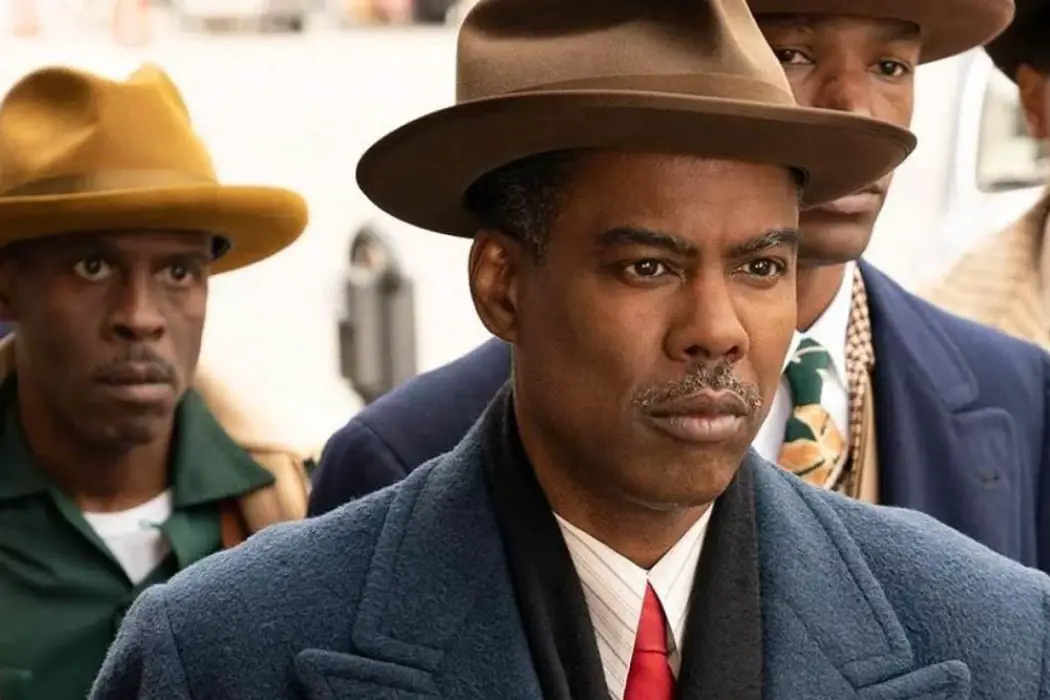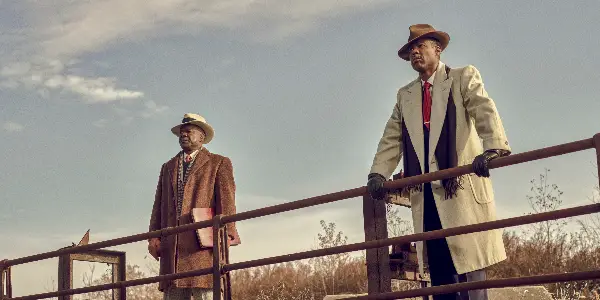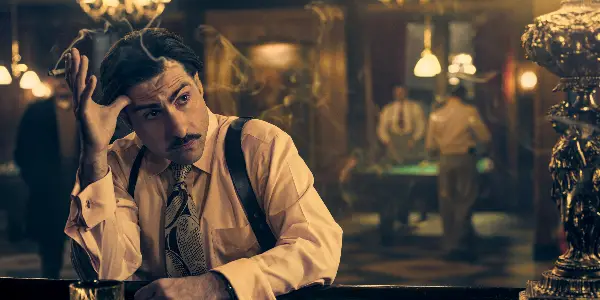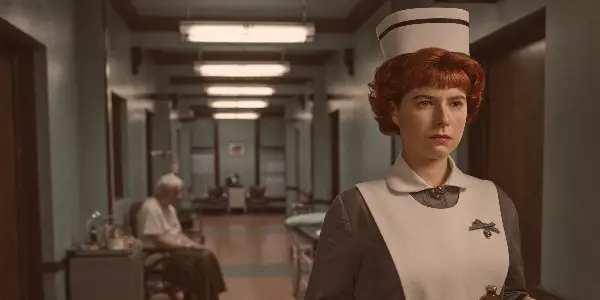FARGO Season 4: Thematically Ambitious But So All Over The Place

Reyzando Nawara is a passionate film and TV enthusiast from…
The fourth installment of Fargo — Noah Hawley‘s crime anthology series based on the Coen Brothers‘ 1996 movie of the same name — opens with a fictionalized history lesson, narrated by a clever 16-year-old biracial girl named Ethelrida Pearl Smutny (E’myri Crutchfield), who, for 24 minutes, explains the power dynamic of Kansas City crime in the early 20th century. First came the Jewish, who were then taken out by the Irish, who were then ousted by the powerful Italian Fadda family. The latest to arrive in the city is the Black crime organization led by Loy Cannon (Chris Rock), though unlike the three previous families, the Cannon Syndicate aren’t exactly immigrants.
On the surface, the story focuses on the tension between the Faddas and the Cannons as the two families vie for control and power over the Midwest America, with elements that have defined the series since its first season — quirky characters doing absurd, eccentric things; dark humor; beautiful cinematography — presented vividly. But where the three previous installments mostly zoom in on the characters’ tendency for violence, this time, Hawley tries to examine something different: racism, immigrant experience, and assimilation. Of course, all of these make the show even more timeless and relevant, but so much of what happens throughout the season, unfortunately, isn’t told effectively using the characters’ actions. Rather, it leans heavily on big words and uninspired monologue. And as a result, what could’ve been a compelling installment of Fargo, exploring what it means like to be an American, ends up as a dull “history lesson.”
Too Much Is Going On
The show kicks off with the Cannon Syndicate arriving in Kansas City around 1950, hoping to have a much better opportunity at making their lives easier. Upon their arrival, they are greeted in an unfriendly manner by the Fadda family, led by Donatello (Tommaso Ragno). Though the Faddas do not entirely welcome the Cannons with open arms, they eventually make room for them as long as they respect a certain condition. The leaders of the two families even agree to trade their youngest son as some kind of insurance policy (in the opening scene, it’s heavily implied that trading children is an old tradition in Kansas City crime scene); though needless to say, things, of course, do not go exactly as planned for both families, especially after Donatello is murdered in a freak accident.

In the wake of Donatello’s death, his eldest son, Josto Fadda (Jason Schwartzman) takes on the leading role. But things get complicated when Josto’s brother, Gaetano (Salvatore Esposito) enters the picture and demands him to be more old-school, and by old-school, he means more violent. The first few episodes of the season spend most of its time observing the power struggle between the two brothers. And while Schwartzman and Esposito are always at the top of their game, bringing depth underneath their characters’ peculiarity, and the dynamic between them even evokes the intrigue of The Godfather trilogy, the show struggles to get something compelling out of them.
It’s obvious at first that through the differences between Josto and Gaetano — and to some extent through a character named Rabbi Milligan (Ben Whishaw), who came from the Irish family but now is living with the Italians — Hawley wants to show the stark distinction between someone who has assimilated himself into the American culture and someone who hasn’t. But unfortunately, most of what happens inside the Fadda family is only played for laughs. We’re never really shown the thought process of these two characters, why they are the way they are, and how cultural assimilation can take part in the way they make their decisions, which clearly is one of the main topics Hawley tries to address this season.
The problem, however, doesn’t just stop with the Faddas. The show also never fully explores the Cannon Syndicate. Sure, we know Loy is smart and savvy and strategic, especially when it comes to creating a business plan with his right-hand man, Doctor Senator (Glynn Turman). But aside from those facts, and the mistreatment and racism they encounter every day from their white neighborhood, the show fails to provide something complex within the dynamic inside the Cannons. And by spending — more like wasting, actually — most of its runtime on the Fadda family, Hawley, once again, robs the show an opportunity to tackle the topic of racism he aspires to examine at the beginning.

That it has a lot of unnecessary characters doing even more unnecessary things certainly does not help either. Outside of Ethelrida, who serves as the show’s moral conscience, there’s an unhinged nurse named Oraetta Mayflower (Jessie Buckley) on the periphery. Her action in the first episode is what sets the plot in motion, but after that, she just kinda exists in a different universe of Fargo, doing weird things without really adding any insight to the main plot. There are also two quirky police officers, Odis Weff (Jack Huston) and Dick “Deafy” Wickware (Timothy Oliphant), who are trying to capture two prison escapees, Zelmare Roulette (Karen Aldrige) and Swanee Capps (Kelsey Asbille), who have some tie to Ethelrida’s parents, Thurman (Andrew Bird) and Dibrell Smutny (Anji White).
To put it simply, there’s so much stuff happening this season, but not all of it feels coherent. Characters doing things without logical reason, and by the time you arrive at the end of each episode, you realize their actions just amount to nothing. What’s frustrating about this is the fact that the season actually has something interesting underneath the whimsicality of the story; that the show’s exploration of the immigrant experience from the perspective of crime syndicates can make this installment of Fargo to be something different and even more compelling than the previous three seasons. If only Hawley knew how to fully flesh those subjects out, instead of desperately trying to please the old fans of the show by recreating the eccentric tone of the past seasons, no doubt this installment of Fargo wouldn’t be this dull.
Well-Acted But Dialogue-Heavy
The other big issue with this season of Fargo is how dialogue-heavy it is. Unlike the previous seasons, where the show simply observes the characters’ actions to hammer home its depiction of good-vs-evil, Fargo season four fills most of its moments with characters doing big, boring speeches about what it’s like to be an American. “If America is a nation of immigrants,” Ethelrida wonders at one point. “How does one become American?” Then on a different occasion, another character notes: “You know why America loves a crime story? Because America is a crime story.”

Of course, there’s nothing wrong with those monologues, but after quite some time, seeing the characters keep talking and talking without really doing anything meaningful gets tiresome. Even in one episode, we see Loy declaring war against the Fadda family for over three times but ends up doing nothing anyway except delivering more dull speeches. If not because of the talented ensemble who each give a stellar performance, this installment of Fargo would be entirely unwatchable.
As Loy, Rock gives such a charismatic but also menacing performance. His presence is soothing, but underneath, there are shades of rage and determination Rock beautifully illustrates in small detail. Schwartzman is as equally engaging as Rock. He not only brings levity to Josto, but also a sense of regret and anxiety. But the MVPs of the season are the women. As Oraetta, Buckley knows how to bring her character’s manic personality without making her too cartoonish. Her performance in each episode, regardless of how irrelevant her role is, will always hook you in. Crutchfield‘s display of maturity also always feel believable. It’s such a shame that the best two performers of the season are not provided with strong materials as the male counterparts.
Final Thought
Fargo season four wants to aim for something bigger, examining racism, assimilation, and immigrant experiences and at the same time trying to retain the eccentric tone of the show’s previous installments. While Hawley‘s effort is admirable, and the performances from the cast keep the show at least watchable, most of what happens throughout the season, unfortunately, feels monotone as it’s too busy delivering big, dull speeches instead of creating compelling actions and arguments about the timeless topics it wants to tackle in the first place.
What do you think of this season of Fargo so far? Let us know in the comments!
Fargo season four is currently airing every Sunday night at 10 p.m. ET/PT on FX.
Watch Fargo
Does content like this matter to you?
Become a Member and support film journalism. Unlock access to all of Film Inquiry`s great articles. Join a community of like-minded readers who are passionate about cinema - get access to our private members Network, give back to independent filmmakers, and more.
Reyzando Nawara is a passionate film and TV enthusiast from Indonesia. When he's not watching TV and movies, he likes to cook and make sorbet.













